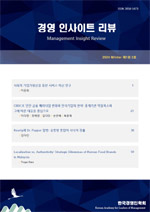학술논문
Localization vs. Authenticity: Strategic Dilemmas of Korean Food Brands in Malaysia
이용수 8
- 영문명
- 발행기관
- 한국경영인학회
- 저자명
- Tisya Ilias
- 간행물 정보
- 『경영 인사이트 리뷰』제1권 제2호, 59~74쪽, 전체 16쪽
- 주제분류
- 경제경영 > 경영학
- 파일형태
- 발행일자
- 2024.12.31
4,720원
구매일시로부터 72시간 이내에 다운로드 가능합니다.
이 학술논문 정보는 (주)교보문고와 각 발행기관 사이에 저작물 이용 계약이 체결된 것으로, 교보문고를 통해 제공되고 있습니다.

국문 초록
한식 브랜드의 글로벌 확장은 특히 말레이시아와 같은 문화적으로 다양한 시장에서 정통성과 현지화간의 균형을 맞추는 데 큰 도전이 있음을 시사한다. 교촌, BBQ 치킨과 같은 브랜드는 말레이시아인의 선호도를 충족시키기 위해 현지화된 적응을 통해 정통 한국 맛을 블렌딩하여 성공을 거두었다. 예를 들어, 교촌은 꿀맛 치킨과 할랄 인증제품을 출시하여 무슬림이 주류인 인구의 요구를 충족시켰다. BBQ 치킨도 말레이시아의 인기 매운 양념에 메뉴를 현지화하는 동시에 100% 올리브 오일을 사용하여 건강에 민감한 소비자에게 어필할 수 있도록 홍보하여 성공하였다. 교촌 말레이시아는 현지 유명인 및 인플루언서와 협력한 마케팅 전략도 성공의 원인이 되었다. 이러한 노력으로 말레이시아인들에게 한식에 대한 접근성과 매력을 높이고 브랜드의 인기를 견인하고 있다. 그러나 과도한 현지화는 이러한 브랜드를 정의하는 진정성을 희석시킬 위험이 있어 전통적인 한국 요리 경험을 원하는 소비자들 사이에 잠재적인 불만을 불러일으킬 수 있다. 예를 들어, 일부 고객은 현지인의 입맛에 맞게 원래 정통 레시피를 수정했을 때 많은 실망감을 나타냈다. 이러한 어려움에도 불구하고 말레이시아 내 한식 브랜드는 유연하면서도 전략적인 접근 방식을 채택하여 계속 성장하고 있다.
영문 초록
The global expansion of Korean food brands has presented significant challenges in balancing authenticity with localization, especially in culturally diverse markets like Malaysia. Brands such as KyoChon and BBQ Chicken have achieved success by blending authentic Korean flavors with localized adaptations to cater to Malaysian preferences. For instance, KyoChon introduced a honey-flavored chicken line and halal-certified offerings, ensuring compliance with the dietary needs of the predominantly Muslim population. BBQ Chicken similarly localized its menu by adding sambalflavored chicken, a nod to Malaysia's popular spicy condiment, while promoting its use of 100% olive oil to appeal to health-conscious consumers. Marketing strategies a lso play a critical role; KyoChon Malaysia h as collaborated with local celebrities and influencers to enhance its cultural relevance and visibility. These efforts have made Korean food more accessible and appealing to Malaysian audiences, driving the brands' popula rity. However, there are inherent trade-offs, as excessive localization risks diluting the authenticity that defines these brands, leading to potential dissatisfaction among consumers who seek a traditional Korean culinary experience. For example, some customers expressed disappointment on social media when classic dishes were modified or removed to suit local tastes. Despite these challenges, Korean food brands in Malaysia continue to thrive by embracing a flexible yet strategic approach, incorporating local tastes without fully abandoning their roots.
목차
Ⅰ. Introduction
Ⅱ. Understanding the Localization-Authenticity Dilemma
Ⅲ. Lessons from KyoChon and BBQ Chicken in Malaysia
Ⅳ. Conclusion
References
해당간행물 수록 논문
참고문헌
- Information Management and Business Review
- Pakistan Journal of Nutrition
- International Journal of Gastronomy and Food Science
- ResearchGate
- KoreaScience
- Journal of International Marketing
- Culinary Science & Hospitality Research
- Journal of Distribution Science
- Perceptual and Motor Skills
- The Journal of Muamalat and Islamic Finance Research
- International Journal of Business and Technopreneurship
- Issues and Perspectives in Business and Social Sciences
- International Journal of Academic Research in Business and Social Sciences
- SSRN Electronic Journal
- Journal of International Business and Entrepreneurship Development
- Asia Marketing Journal
관련논문
경제경영 > 경영학분야 BEST
- 소비자의 ESG경영요구가 ESG경영지지에 미치는 영향
- 근로시간 단축(주 4일제) 관련 글로벌 동향 분석과 변화 방향 제언
- 직무만족, 조직몰입, 성과, 이직의도 간의 관련성 - 문헌고찰 및 메타분석
경제경영 > 경영학분야 NEW
- Determinant Factors of Innovative and In-Role Job Performance Mediated by Work-Life Balance
- Financial Performance and Firm Value: The Moderating Role of the Exchange Rate
- The Influence of Financial Literacy and Risk Tolerance on Retirement Financial Planning
최근 이용한 논문
교보eBook 첫 방문을 환영 합니다!

신규가입 혜택 지급이 완료 되었습니다.
바로 사용 가능한 교보e캐시 1,000원 (유효기간 7일)
지금 바로 교보eBook의 다양한 콘텐츠를 이용해 보세요!



